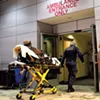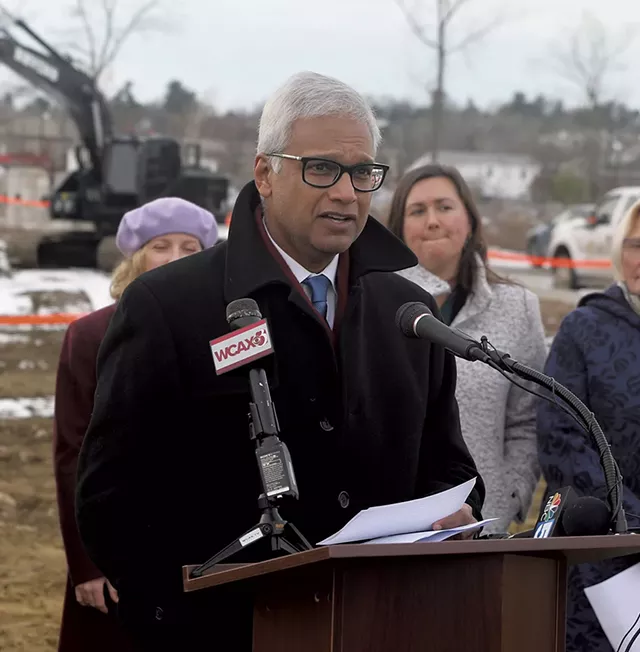Most immediately, the network said on Tuesday that it had laid off 77 employees and eliminated another 69 vacant positions. The layoffs, which the network said would save $5 million, are mostly in finance, human resources, project management, and continuing education, along with some staff who interact with patients, according to the network.
The network will save another $7 million to $10 million by eliminating executive bonuses this fiscal year.
The cuts represent the health network’s latest step to reduce its spending in the face of increasing pressure from regulators and the public. Vermonters pay some of the highest health insurance premiums in the nation. Insurers blame that on the high prices charged at Vermont hospitals, which rank among the most expensive in the country.
Health Care Leaders Are Scrambling to Prevent Another Major Insurance Hike
Health Care Leaders Are Scrambling to Prevent Another Major Insurance Hike
By Colin Flanders
Health Care
There’s also uncertainty surrounding President Donald Trump’s “One Big Beautiful Bill,” which could, by some estimates, result in 45,000 Vermonters losing their Medicaid coverage.
“We know health care is too expensive. And we have a sense of urgency, that I think our community members and our patients are feeling, to reduce costs,” network CEO Dr. Sunny Eappen said during a press conference on Tuesday afternoon.
“We know staffing reductions are necessary. These actions do impact our colleagues or our communities, our friends and our families. We’re doing everything we can to support them through this transition,” said Mary Broadworth, vice president of human resources at UVM Medical Center, the network’s largest hospital.
According to Eappen, workforce shortages are the biggest factor in the rising cost of health care. Across the country, he said, there are probably 15 to 20 percent fewer physicians and nurses than needed.
The hospital network said the decisions “builds on earlier actions the health system took throughout the year to gradually cut several hundred of primarily non-direct patient care roles.” Last year, the network eliminated 120 vacant positions.
“One way is through attrition, and when people leave, we don’t backfill that position,” Broadworth said. “Staffing is our largest expense as an organization. For every dollar that comes into the UVM Health Network, about 36 cents goes to compensate our non-physician workforce.”
Proposed Medicaid Cuts Would Have Big Impact in Vermont

Proposed Medicaid Cuts Would Have Big Impact in Vermont
By Colin Flanders
Health Care
Officials said they will continue to look at other ways to reduce costs, such as standardizing equipment and medications at hospitals and clinics across the network, hiring more local staff instead of using more expensive travelers, and deferring building maintenance.
Their total target for cost reductions is $300 million, including savings already achieved in the last 18 months.
Deferred maintenance can help save $70 million by “prioritizing projects with greatest need and long-term impact.” The network said improvements to the garage at UVM Medical Center is one project they’ll push off until later.
They plan to try and lower the cost of clinical care by making different medical device choices, reducing testing deemed unnecessary, and minimizing inpatient stays, which they say could save $60 million.
“If we’re keeping patients in the inpatient setting longer than we need to, let’s find out why and try and cut that short,” said Dr. Ramsey Herrington, the network’s chief physician officer. He also mentioned ways to save costs on radiology by fine-tuning the amount of imaging done and radiologists contracted.
Reducing the amount of spending on traveling staff could save the network $30 million. Seven Days has previously reported on the tens of millions the network spends on traveling nurses.
Health Care Costs in Vermont Continue to Soar

Health Care Costs in Vermont Continue to Soar
By Colin Flanders
Health Care
“We’ve got an ongoing target to keep reducing that, and we’ve been hitting those numbers, and the overall expense for the travelers has also been going down,” Eappen said.
The network also said its board of trustees approved a measure to pause performance-based variable pay — bonuses — for leadership positions until the next fiscal year begins, which could save somewhere between $7 million and $10 million. “Real estate optimization,” by consolidating space, could save another $400,000.
“Quite frankly, what we’re seeing today is a microcosm of what’s happening throughout the country, and particularly in rural health care,” Eappen said.

